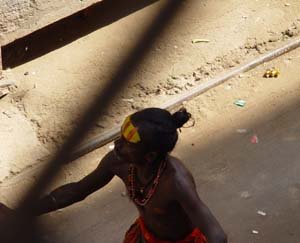The British tourist had been invited by the man to accompany him to a visit to his ancestral village. But a few hours after they had lunch at the resort, the Brit found himself kidnapped on gun-point and dumped in a dark room in Ghaziabad town, neigbouring Delhi. It was by sheer chance that a Police party, investigating a case of cycle theft, crossed way with the kidnappers and the tourist was rescued.
Twelve years later, I am at the Cheetal Grand resort, trying to Imagine that I am sitting on the same chair on which sat Omar Sheikh, the bespectacled man, who would grab headlines, worldwide, years later, for the gruesome murder of journalist Daniel Pearl. It is an October afternoon and instead of chess, I have in mind a long journey, which I have planned to undertake with a friend of mine.
Earlier that day, we left Delhi, on an Enfield motorcycle. The plan is to take a night halt at the holy town of Rishikesh, where flows the river Ganges, and then proceed to Srinagar town in Garhwal. We have no further concrete plans. The aim is to just let things happen. Like Che Guevara and his friend Alberto Granado, we just want to explore as much as we can and bask in the glory of the miles covered. Rishikesh is 225 kilometres from Delhi and Cheetal Grand resort is approximately mid way. After a breakfast of Masala Dosa and a lemonade, we proceed on to Rishikesh.
It is towards late afternoon when we reach Rishikesh after crossing Haridwar. The market is bustling with foreigners, mostly from Israel, who have come to Rishikesh in search of Nirvana. Some of them have been staying here for months now, in cheap hotels and paying-guest accommodations. No wonder, I see a restaurant carrying this message: Israeli, Japanese, Nepal-special Chowmein (whatever that means), Italian, Continental cuisine served here. Next to the restaurant is a barber’s shop, where a foreigner is getting his head tonsured. We check in a hotel on the banks of the Ganges. Tariff: Four hundred rupees. I am in a mood to complete this journey in a shoe string budget.
Inside the hotel room, the first thing I do is hide the remote control of the Television that looks down at us from a pedestal. I don’t want my companion to succumb to the temptation of watching the prime-time news bulletin in the night. After a bath in the freezing cold water, we just lie down on the bed to comfort our bottoms. My friend, you see, has not cushioned the seat of his motorcycle.

The sun is setting and we venture out. After gulping down a bottle of water, we cross the Ram Jhula. There are two rope bridges in Rishikesh named after the Hindu God Rama and his brother Lakshman. We cross to the other side to witness the evening Aarti (prayers). Every morning and evening, there is a prayer session on the banks of the Ganges. We can hear it from a distance – the sound of drums and cymbals. Devotees have gathered over the stairs of a temple and they are signing hymns in praise of the Ganges and Krishna. Young boys, wearing saffron dhotis, who have vowed to a life of celibacy, are singing passionately. Between prayers, they raise their hands in unison to offer their salutations to God. Many tourists form a part of the prayer group.

Earthen lamps in small baskets made of leaves are put in the river waters. The lamps bedazzle the water around them and after they have traversed till some distance, they topple in the water as it gains momentum. The water is in a hurry. There are people waiting for it. Waiting to be absolved of their sins.

There are many book stores and music shops selling stuff on Yoga, spirituality and Hindu way of life. On our way back, I can hear an English artist chanting Hare Rama, Hare Krishna in her album. We are going to have food in Chotti wala Baba Restaurant. It is very famous among tourists in Rishikesh. In the evening, a man dressed as a Sadhu sits outside the restaurant on a bridegroom’s chair. It is a gimmick to attract tourists and it also serves as a signboard. Not that you need them in a small place like Rishikesh.

Next morning, we take off for Srinagar, which is 105 kilometres from Rishikesh. The plains give way to hills, as we find ourselves under the shadow of the Himalyas. I am about to experience a very strong déjà vu.
To be continued…






